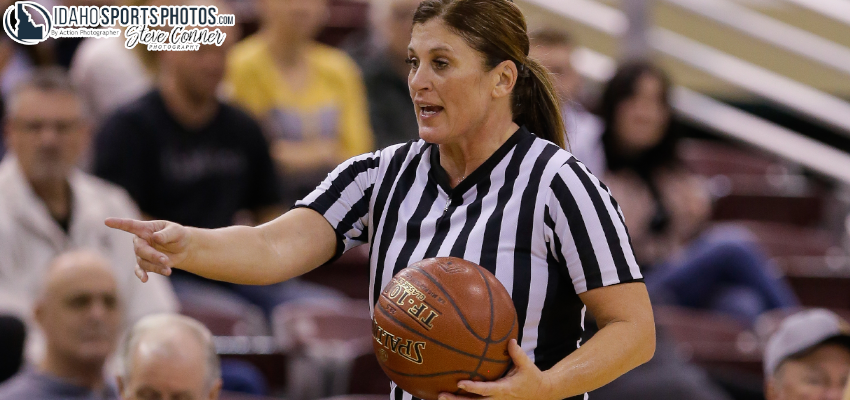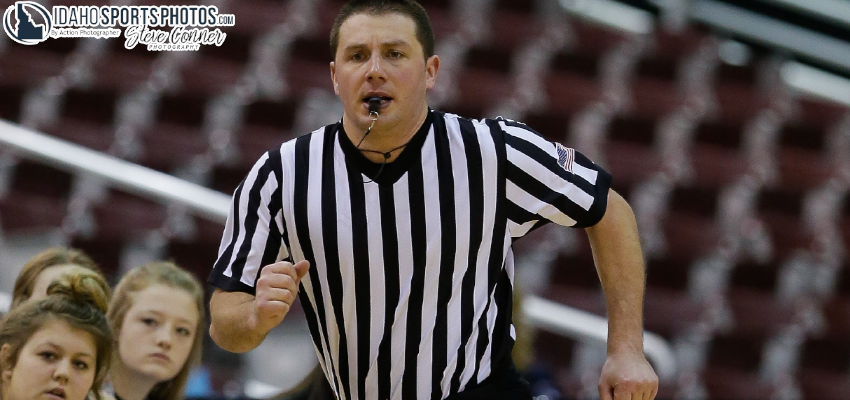|

(This article was posted a year ago, but we thought it was a good idea to post it again. A few minor details may have changed over the past 12 months, but the bulk of article itself is still accurate.)
On a January night at a Treasure Valley high school, Tyson Jones took to the court.
Armored with more than two decades of experience, Jones was prepared to effectively officiate yet another Idaho basketball game. And much like other instances in his career, he knew what possibly lie ahead.
Sure enough, as players and coaches began gearing up for tipoff, Jones spotted a pair of fans — a husband and wife — known for unruly behavior directed toward referees.
“This female's husband was once kicked out of all of the district activities for one full year for attacking one of our officials during a varsity girls game,” Jones said. “She herself had been removed from five different games before her own husband’s assault on this particular official.”
Luckily for Jones, no such assault occurred that night, though he did catch glimpses of the woman mouthing “you’re terrible” to him and his fellow officials. Jones brushed it off, much like other officials across the state must do on a regular basis.
“I have experienced plenty of harassment and verbal abuse throughout these 23 years. One thing you learn to develop in officiating is a strong sense of humor for ignorant people,” he said. “Most people who yell and scream at officials have very little knowledge of the actual rules for the game of basketball.”
Jones, assignor for the Boise and Meridian Junior High School leagues, said while he had never been physically assaulted, officials he’s worked with have been accosted by parents and fans, even at the eighth-grade level.
“For people to think eighth-grade basketball is that important is just ludicrous,” he said. “Parents think we’re trying to screw over their kids. That’s not at all what we’re trying to do. We want the kids to decide the game.”
Serious instances of official harassment can quickly get out of hand, according to District II Rules Interpreter Darren Malm.
“During the state tournament in 2004, a fan threatened my partner and I during the last two minutes of a consolation game,” Malm said. “He told us that he was going to meet us in the parking lot and ‘kick our f---ing a--es’ after the game.”
Malm and Jones aren’t alone. Statewide, officials run the gauntlet of harassment year round.
Declining Resources
The rates of pay for Idaho officials can differ somewhat across the state’s six districts, according to Tyler Ostler, coordinator of officials for the Idaho High School Activities Association.
But for Idaho’s more than 1,800 working officials, pay above $70 per game is all but nonexistent in the regular season, no matter the sport. Once state tournament time hits, Ostler said officials receive $71 per game for basketball and $74 for football.
Up in District I, officials can expect $64 per varsity football game this fall, up $2 from the 2019 season. And on the hardwood, refs will pocket $65 per game if part of a two-official crew.
But conflict comes into play when another official is added to the mix. Next year, District I officials in a three-person crew will only earn $57 next season, also up $2 from last year. And while the cut makes financial sense, it does not represent the work put forth by the officials during the game.
When more officials take the court, the workload can sometimes increase, as refs are keying in on intricate details of the game they would otherwise not have time for, something not reflected by the $8 decrease.
The problem is not unique to Idaho. According to a Seattle Times report, Washington officials receive somewhere between $62 and $69 per game, totaling between $1,000 and $5,000 annually.
Meanwhile, the number of new officials entering the system has declined nationwide in recent years, so much so that the National Federation of High Schools began the #BecomeAnOffical initiative, encouraging young people to take part in the officiating experience.

For Adam Clark, vice president of basketball in District V, sportsmanship issues sit at the heart of the nationwide problem, and Idaho is no different.
“Negative interactions that occur with coaches, fans and parents turn younger officials away and cause some veteran officials to hang it up,” Clark said. “These sportsmanship issues seem to be on the increase nationwide, with many areas outside of Idaho much worse than what is experienced here.”
And while, according to the NFHS, officiating can be a fruitful side hustle, Clark said the time commitment can prove unrealistic when coupled with a full-time job.
“The requirements that many full-time employers put on people make it difficult for someone to start officiating, as many youth games or underclassmen games fall in the afternoon and people don't want to take time off from work to officiate,” he said.
Malm agreed, adding that some of the best young recruits are often deterred because of this.
“Time and commitment are huge hurdles. I still officiate in District II and when I started in 1991, we had 90-plus officials. Now we are at 43,” Malm said. “College students are no longer interested in working games and others have left due to fan behavior.”
The Response
Earlier this year, NFHS Executive Director Karrissa Niehoff reported that around 4,000 men and women registered to become an official in 2019. But, according to Niehoff, a growing concern is that while new officials are entering the system, the growth could be “offset by other officials heading out the back door because of the continued boorish behavior on the part of parents and other fans.”
According to Clark, negative interactions with fans are the main cause for declining participation. However, he agreed with the sentiment that Idaho officials are underpaid, saying $100 per game would seem fair, a far cry from the current mid-60 mark.
“From a personal experience, I have to eject a few fans that have taken it too far,” he said. “It really is a matter of abusing players and officials with profanities and making attacks personal, even sometimes racial. Fans can become crazy.”
While the pay rate in Idaho might be lower than other states in the northwest, contracts are negotiated every couple years, and according to District V Secretary Lee Ralphs, rates increase roughly $2 per negotiation, an increase seen in District I as well.
But unless drastic measures are taken, Jones said the pay is still not enough.
“The money officials make is in no way enough for the time they put into their efforts,” he said. “I am not sure if the compensation is adequate for the time all of these fine people have put into it.”
But Jones acknowledged most don’t get into officiating for the money. For him, the experience has been incredibly fruitful, leading to life-long friendships and comradery.
“The people surrounding the game of basketball, for the vast majority, are great and just want to make an impact in a young kid's life,” Jones said. “I get a front-row seat to that taking place every night I put the stripes on.”
As for those wanting to become an official themselves? Go for it, Jones said.
“There is so much satisfaction in giving back to the game and the kids,” he said. “There is a huge need for people to give just one night a week. Officiating gets in your blood and it’s hard to get it out.”
|